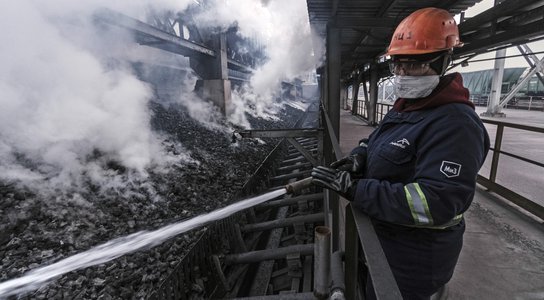Breaking the ice
PAO Sovcomflot is Russia’s largest shipping company. Its fleet of over 130 ships, from hulking vessels capable of cracking through two metres of ice to tankers hauling millions of barrels of oil, serve only the fossil fuel industry. Many of its vessels, such as the Lomonosov Prospect, are chartered by oil and gas companies, and commodity traders, to move the fuels that are funding Russia’s war against Ukraine.
“Ukraine is a crime scene,” Karim Khan told reporters on April 12 2022. Khan, the chief prosecutor of the International Criminal Court, was in Bucha, Ukraine, where hundreds of civilians were allegedly murdered by Russian troops. That day, commodity shipping information accessed via Refinitiv Eikon indicated that thirteen Sovcomflot vessels, carrying over one million tonnes of crude and fuel oil loaded from Russian ports, were currently at sea. This is a single day’s snapshot of the company’s business. Many other Sovcomflot vessels have loaded and discharged oil and gas since the invasion of Ukraine – keeping money flowing into Vladimir Putin’s war chest.
Losing steam
The Russian Federal Agency for State Management controls 82.8% of Sovcomflot. The remainder of the company’s shares have been publicly traded on the Moscow Exchange since 2020.
Sovcomflot’s status as a primarily state-owned company has now seen it explicitly named in the growing list of sanctions against Russia. On the day of Russia’s invasion of Ukraine, February 24, the United States blocked Sovcomflot from raising new funds from the US debt and equity markets. The United Kingdom subsequently placed an asset freeze on Sovcomflot, making it effectively impossible for UK entities to conduct financial transactions with the company. Even the EU, which has lagged in banning Russian fossil fuels outright, has sanctioned the shipping giant—though tellingly, it made exceptions for shipments of coal, oil, and fossil gas: the only commodities Sovcomflot ships.
In response to these sanctions, and a call to action from Ukrainian President Volodymyr Zelenskyy’s office, marine insurers based in the UK and Europe have begun dropping Sovcomflot from coverage. The organisation that certifies 90 SCF vessels’ compliance with technical standards has begun winding down its work with the company in accordance with sanctions. President Zelenskyy is now calling for allies to seize and sell Russian assets, including Sovcomflot’s fleet, to pay for the rebuilding of Ukraine. And on May 3, Lloyd’s List reported that SCF was selling up to a third of its fleet to pay off debt.
All the institutions supporting Sovcomflot’s operations appear to be pulling away. Who’s left standing?
Don’t get caught up
Shareholding information accessed via financial data provider Refinitiv on April 12 shows that the some of the world’s largest asset managers remained among the owners of the publicly traded portion of Sovcomflot. These include BlackRock, the world’s largest asset manager, which is facing sustained criticism over its role in driving the climate crisis by investing in fossil fuels and deforestation industries. The Vanguard Group, Inc., one of the biggest investors in fossil fuels in the world, is another shareholder.
These investors’ initial responses to the invasion of Ukraine struck a familiar note. Capital Group, which held stock in Sovcomflot worth over $16 million, called the war against Ukraine “deeply troubling” and “devastating”. BlackRock said “We deplore the human toll and tragedy all this may bring” and halted purchases of Russian securities in its active and index funds. The asset manager said it was consulting with regulators to ensure its clients could exit their positions in Russian securities, where allowed, according to Reuters.
Vanguard, which held over $4 million in Sovcomflot stock, issued a statement saying: “Russia’s invasion of Ukraine has shocked us all. It has caused a tragic loss of life and a humanitarian crisis. The political, social, and economic ramifications are still unfolding.” The asset manager added that it had “suspended purchases of Russian securities across our internally and externally managed active funds and are actively working to further reduce our exposure to Russia and exit the positions across our index funds”.
A day after the invasion, Charles Schwab described the human cost of military action as “incalculable”. But, the wealth manager added, “The takeaway for investors is to avoid getting caught up in dramatic events as they unfold, as it rarely leads to wise decisions.”
On March 1, Russia put in place new restrictions on foreign investors, with the aim of preventing companies from pulling their investments from Russian companies.
Global Witness asked these four Sovcomflot investors whether they had managed to divest from the company. A Vanguard spokesperson repeated the company’s earlier public statement.
“Schwab Asset Management continues to communicate daily with brokers and custodians to seek out potential ways to exit Russian securities,” a spokesperson said, noting that its "exposure to this sanctioned Russian security is primarily driven by the fact that the [relevant] fund has a passive investment strategy”.
"At this time, foreign investors continue to be restricted from trading.”
BlackRock, Capitol Group, and Sovcomflot did not respond to Global Witness’s requests for comment.
“It’s unfortunate that these asset managers did not exclude Sovcomflot from their holdings when they had time to do so,” said Lela Stanley, senior investigator at Global Witness. “They—and their customers—are now stuck with a company whose entire business model is moving Russian fossil fuels and therefore helping fund this war. If we needed more proof that investing in the fossil fuel industry is a losing bet, this is it.”
Preview image credit: Photo by Erik McGregor/LightRocket via Getty Images


![4. PROFITEERING ARTWORK [2B].jpg](https://cdn2.globalwitness.org/media/images/c.ab9beca2.fill-544x300.png)